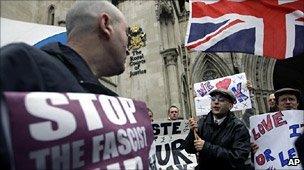High Court reserves judgement in BNP membership case
- Published

Rival demonstrators gathered outside the court on Monday
A legal ruling in a long-running dispute over the BNP's membership policy will not be made for at least a week after the conclusion of a High Court hearing on Tuesday.
The party voted to change its rules after facing a court injunction over its "whites only" membership.
But the Equality and Human Rights Commission has argued the new rules were still "indirectly discriminatory".
BNP leader Nick Griffin has applied for the case to be thrown out.
Judgement in the case has now been reserved for at least a week.
Mr Griffin, who had vowed to represent himself, was not at court as he is in hospital being treated for suspected kidney stones.
But BNP supporters and rival activists from Unite Against Fascism gathered outside the Royal Courts of Justice before the first day of the committal hearing began on Monday.
'Significant breach'
Earlier this year BNP members backed changes to the party's constitution to allow "non-indigenous Britons" to join, after the equalities watchdog took legal action.
But the Central London County Court heard in March that prospective members still had to sign up to principles including a duty to oppose the promotion of any form of "integration or assimilation" that impacted on the "indigenous British", and a requirement to support the "maintenance and existence of the unity and integrity of the indigenous British".
The commission argues that the principles could be interpreted to oppose mixed marriages and could force people to deny their own identity.
Robin Allen QC, acting for the commission, told the High Court on Monday that the BNP had "played with" the watchdog over the issue and had "persistently" failed to comply with previous court rulings.
Although he acknowledged that the party's constitution had now been largely revised, he said the offending clauses had been suspended not removed - describing this as a "significant breach".
The Commission is applying for the committal of Mr Griffin, BNP deputy Simon Darby and party officer Tanya Lumby.
But, David Reade QC, appearing for Mr Griffin and Mr Darby, said there was no case for the party to answer as the rulings on its constitution were ambiguous.
"Where there is a court order that is unclear as to the facts, or ambiguous, committal is not appropriate," he said.
In a statement, the party described the legal action as a "taxpayer-funded assault on our freedom of association" that it would continue to fight.
The BBC's Mike Sergeant said that if the BNP lost the case, the equalities watchdog was likely to press for a substantial fine or for the party's assets to be seized.